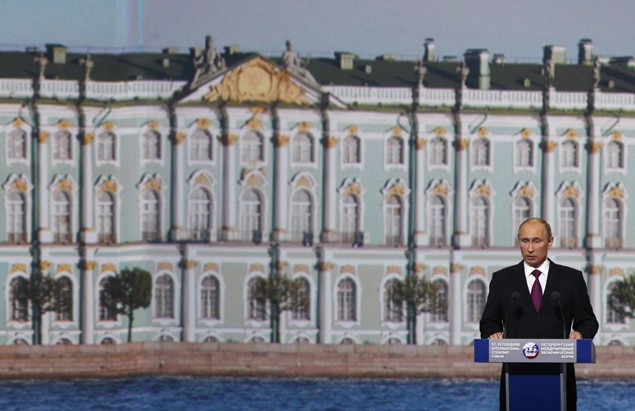UK Strikes at Heart of Russia’s Arctic Energy Empire
New maritime services ban threatens to sever lifeline for Yamal LNG exports By Paul Morgan (gCaptain) – In the frozen waters above the Arctic Circle, a fleet of specialised ships...

Russian President Vladimir Putin addresses participants of the St. Petersburg International Economic Forum in St. Petersburg, June 21, 2013. REUTERS/Alexander Demianchuk
![]() ST PETERSBURG, June 21 (Reuters) – Russia’s Rosneft agreed to a $270 billion deal to double oil supplies to China on Friday, as the Kremlin energy champion shifts its focus to Asia from saturated and crisis-hit European markets.
ST PETERSBURG, June 21 (Reuters) – Russia’s Rosneft agreed to a $270 billion deal to double oil supplies to China on Friday, as the Kremlin energy champion shifts its focus to Asia from saturated and crisis-hit European markets.
The deal, one of the biggest ever in the history of the global oil industry, will bring Rosneft $60-70 billion in upfront pre-payment from China, the holders of the world’s largest foreign exchange reserves.
It will also allow Rosneft, the world’s biggest publicly listed oil firm, to steeply cut its heavy debts and develop new remote Arctic fields.
“The estimate of the sum of the contract in today’s market prices is absolutely unprecedented – $270 billion,” Russian President Vladimir Putin told an economic forum in Russia’s St Petersburg after the deal was agreed.
The agreement highlights a growing partnership between China, the globe’s top energy consumer, and Russia, the largest oil producer, and comes despite previously uneasy relations between Rosneft and Beijing over energy pricing.
Rosneft’s boss Igor Sechin, a close ally of Putin, said his firm will supply China with 300,000 barrels per day over 25 years starting in the second half of the decade, on top of the 300,000 bpd it already ships to the world’s No.2 oil consumer.
Putin later said total supplies could amount to as much as 900,000 bpd.
The speed of change in Russian export patterns has been dramatic – switching huge volumes from Europe in only five years.
Russia first started supplying China by railway and then by a new pipeline while opening a Pacific port, Kozmino, in 2009.
Together with supplies to Kozmino, it is already exporting around 750,000 barrels per day to Asia, or 17 percent of its overall exports of 4.4 million bpd.
Europe, by contrast, has lost out. A decline in deliveries in the past few years partially contributed to Russian Urals crude oil often trading at a premium to benchmark dated Brent.
Analysts have expressed doubts Rosneft could quickly boost supplies to China from depleted fields in West Siberia, the historic homeland of Soviet and Russian oil production.
A source familiar with the deal said the new agreement with China was timed to tie in with the launch of new streams of East Siberian crude to avoid big redirection of existing flows and allow time to expand export infrastructure.
Rosneft and oil pipeline monopoly Transneft have already secured $25 billion from China in 2009 in upfront payments by pre-selling oil in order to accumulate cash to finance growth and new construction projects.
Rosneft’s debt burden has spiked this year after it acquired Anglo-Russian producer TNK-BP in a $55 billion cash-and-stock deal, the largest in Russian corporate history, and became the world’s largest publicly listed oil firm.
Industry sources have told Reuters Rosneft may secure up to $30 billion in prepayment from China as part of the new deal. On Friday, Putin said pre-payments could amount to $70 billion.
Analysts said the possible upfront payment from China would be a big positive for indebted Rosneft.
“If confirmed, this would be a transformational event for the company’s balance sheet: Rosneft could even potentially be able to show a net cash position, though working capital would be negative. The prepayment could minimize financing risks for the leveraged state-controlled oil company,” J.P. Morgan analysts said in a note.
TRADERS’ ROLE GROWS
According to Standard and Poor’s, Rosneft faces large debt maturities in 2013, 2014, and 2015 of $6.6 billion, $15.9 billon, and $16.2 billion, respectively.
Prepayment from China would allow Rosneft to lighten the burden on its balance sheet by reducing debts to banks.
The company has also used other schemes to reduce its debt, including receiving $10 billion from Glencore and Vitol, the world’s two largest oil trading houses, in exchange for five years of supplies.
The money was borrowed by the traders for Rosneft and gave the two Swiss trading houses unprecedented access to Russian crude supplies in Europe.
On Friday, Swiss trading house Trafigura, the world’s third largest, agreed to a similar deal by pre-paying Rosneft $1.5 billion for receiving 10 million tonnes over 5 years.
Separately, Rosneft clinched a $7 billion deal with Polish refiner PKN Orlen to deliver 8 million tonnes of crude oil to the Czech Republic via the Druzhba pipeline.
It also signed a preliminary deal with Vitol to sell liquefied natural gas (LNG) from a Rosneft’s planned plant in eastern Russia from 2019.
(c) 2013 Thomson Reuters, Click For Restrictions

Sign up for gCaptain’s newsletter and never miss an update

Subscribe to gCaptain Daily and stay informed with the latest global maritime and offshore news
Essential news coupled with the finest maritime content sourced from across the globe.
Sign Up